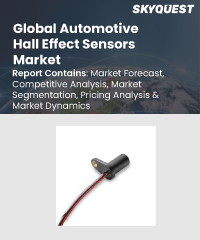
Product ID: SQMIG45K2068

Report ID:
SQMIG45K2068 |
Region:
Global |
Published Date: March, 2024
Pages:
197
|
Tables:
61 |
Figures:
75
Global Automotive Hall Effect Sensors Market Drivers
Increasing Demand for Advanced Safety Features in Vehicles
Growing Adoption of Electric and Hybrid Vehicles
Global Automotive Hall Effect Sensors Market Restraints
High Cost of Advanced Sensors
Increasing Competition from Alternative Sensor Technologies
Our industry expert will work with you to provide you with customized data in a short amount of time.
REQUEST FREE CUSTOMIZATIONWant to customize this report? This report can be personalized according to your needs. Our analysts and industry experts will work directly with you to understand your requirements and provide you with customized data in a short amount of time. We offer $1000 worth of FREE customization at the time of purchase.

Product ID: SQMIG45K2068